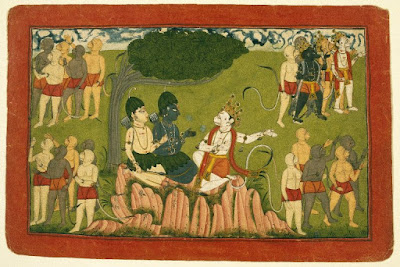Reading Notes: Jataka Anthology
Figure 1: Typical Depiction of The Buddha Wikimedia
The Foolish, Timid Rabbit by Ellen C. Babbitt
Until relatively recently I was rather dismissive of these moralizing stories. This story is about a mass hysteria caused by an initial overreaction to some stimulus. The overreaction is halted by the lion, who while monstrous and predatory is also brave and unafraid. Inspecting the initial issue it is found that there was no real issue to begin with. these stories seem obvious now, but I suspect that at the time of this stories' writing it was the most efficient way to state that not overreacting and confronting one's fears was an optimal course of action. It also states something that the modern incarnation of this saying does not: to confront that which you have overestimated requires the fiercer part of your mind or a fierce external individual. I think I'll keep the lion around.
Two Turtle Jatakas by Ellen C. Babbitt
The Cunning Crane and The Crab by W.H.D. Rouse
Like the other two stories, this is a simple story, and its quite easy to tell that the story is very old. It has issues caused by the characters' sudden lapse in intelligence. Although the fish are established to be stupid, their gullibility is almost comical, and the crane also seems to be unusually gullible.
Monkey by Marie L. Shedlock
I think that I have figured out why the characters in these old stories are so unusually gullible. Statistically speaking, most people will be targeted and betrayed by a psychopath at some point in their life, and when most people look back on that betrayal they probably feel it was quite obvious. Perhaps gullible characters are more useful than I had initially estimated.
Crocodile by Robert Chalmers
This story genuinely confused me as to why the monkey noticed the crocodile was present. I suppose I should strive for more clear narration.
The Monkey who Gathered Lotuses by Robert Chalmers
I'm starting to notice a theme with monkeys here, I wonder why they are so appealing as trickster figures. Tales about infanticide and the futility of trying to stifle the next generation are very common, maybe I'll utilize that.
Unruly Monks by Robert Chalmers
I've read this story before.
I don't get this one.
Goblin City by W.H.D. Rouse
I've often found that people cause most of their own problems. People are often willfully ignorant of the danger of their own misdeeds and are harmed by this. Perhaps a city of goblins is a useful setting for this. In general, I think that this was the most useful concept out of the entire anthology.
Jatak Anthology - Assembled by Laura Gibbs
Sorry, I just thought all the stories had a little bit of interest.



Comments
Post a Comment